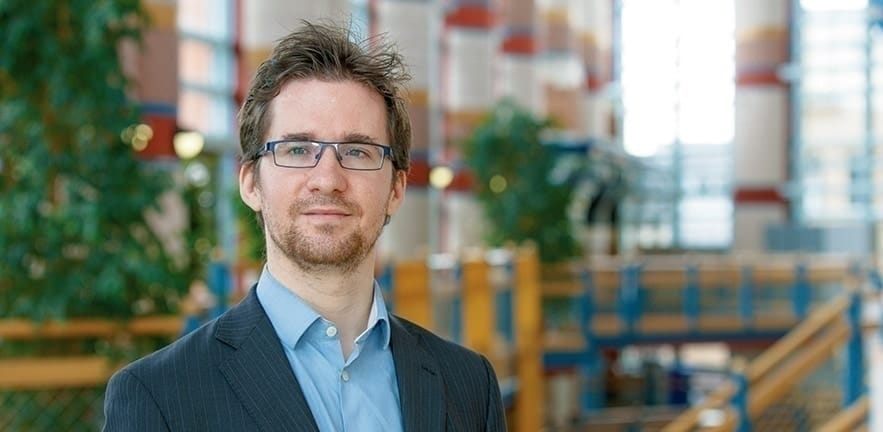An early start, from game theory to the science of psychology
If a teenage David Stillwell hadn’t idly picked up a copy of his older brother’s book on game theory, then he might not have gone on to link big data to the science of psychology.
“My brother was an undergraduate studying economics at the University of East Anglia (UEA), and he brought home this book about game theory. I loved economics as a discipline, especially the way it tries to explain all of human behaviour with just a few equations about material motivations. But reading about game theory showed me this doesn’t work in the real world. I decided to study psychology as a result.”
Even as an undergraduate, David Stillwell was convinced that you could not understand psychology unless you have a lot of data. He decided to collect his own, creating the myPersonality Facebook application in 2007, during the summer after he graduated from the University of Nottingham.
myPersonality app and Facebook research
myPersonality allowed users to take real psychometric tests and obtain their results instantly. With around 40% of the respondents also opting in to share data from their Facebook profile, Stillwell’s app ultimately produced one of the largest social science research databases in history, collecting data from over 6 million volunteers over the five years of the apps life.
Meanwhile, after an MSc at Nottingham in Psychological Research Methods, David went on to his PhD around decision-making. “In some ways, it felt like I was studying economics in a psychology department. Then after my PhD, I moved to the Psychometrics Centre in the Department of Psychology at Cambridge.”
His prominence in linking social media data to psychological behaviours caught the eye of the Cambridge Judge Business School. “In September 2015 I was the first person to be brought in specifically for Big Data. It was a brave move as I had no background in business, but my brief was simple – we’re strong on qualitative analysis, what can we do with Big Data?”
Teaching on the MBA at the Business School
With his new post of Lecturer in Big Data Analytics and Quantitative Social Science came teaching responsibilities. “My background was in teaching psychology students, and I soon found I needed a completely different approach at the Business School, especially for the MBA students. I had to first understand what they were trying to get out of the classroom.”
“And I am afraid to say my first year MBA teaching ratings were genuinely horrific! I was teaching the same content to the Executive MBAs and getting much better ratings. I realised the executives, a few more years down the career line, were looking for big picture and team leading lessons. But the MBA students were much more interested in the wide-ranging practical aspects.”
David set about changing the way he taught MBA students and today his Managing Big Data elective on the MBA is vastly oversubscribed. In 2022 he was one of 7 members of the faculty to be awarded a teaching prize for excellence.
“It’s been a medium speed climb to the top! I enjoy helping my students pick up new skills and trying new things. For the last 5 years I have been teaching Machine Learning without mathematics but this term I started including some equations. The students’ reaction completely surprised me – there was very positive feedback and it reminded me again that MBA students often want to go deeper into areas which I, or even they, might not expect.”
Artificial intelligence
One recent development which David is keen to engage with his students on is that of artificial intelligence (AI). “I believe AI will prove to be at least as big a jump for society as the introduction of the Internet. A lot of things are going to change, particularly the way we do our jobs. AI will not replace doctors, but doctors complemented by AI will replace doctors without AI. But if we can be sure there is great change ahead, we also don’t yet know what that will look like. Cambridge MBA students must be prepared to be open and experimental.”
David encourages his students to understand the technology behind AI. “If you get that, you also get what it can’t do. At least at the moment. But AI is progressing faster than I expected. If you had asked me a year ago ‘how long until a computer can explain a joke?’, I’d probably have said ‘decades away’. And, of course, it happened 6 months later.”
He and his colleagues are now engaged in personality testing AI. “Companies want to know if you can measure the behaviour of AI in the same way as you measure people. Can you tell it to act extroverted, for example – which has important implications for therapy.”
Taking the reins as the next MBA Deputy Director
This September, as we enter the new academic year, David will take over from Thomas Roulet as Deputy Director of the MBA programme. “I am really looking forward to engaging with local companies through setting up the Cambridge Venture Project (CVP) and Global Consulting Project (GCP), for example. My research is about understanding behaviour in customers, teams, employees, and I am hoping to find some cutting-edge companies out there.”
Meanwhile his own teaching on big data remains at the forefront of the science. “I say on day one of the course that there is no Big Data textbook. It would be out of date before you had finished writing chapter one, the subject is changing so fast and across such a range.”
When it comes to teaching about AI, David suspects his students may know more than he does. “We are all learning from each other because no one yet knows how this is going to turn out. Even the creators of AI don’t know. The world is very random, and I try not to make too many predictions.”


